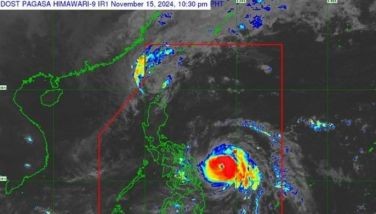Strong peso hurting OFWs, labor group says
January 10, 2006 | 12:00am
In contrast to the government’s rejoicing, overseas Filipino workers (OFWs) and their families are hurting over the fall of the US dollar versus the peso.
A strong peso has caused a six percent drop in the purchasing power of OFWs and their families, the moderate Trade Union Congress of the Philippines (TUCP) said yesterday.
Former senator Ernesto Herrera, TUCP general secretary, said OFWs who helped push the value of the peso are not benefiting from their contributions to the economy.
"OFWs and their dependents have lost six percent of their potential buying power at a time when they need it most, owing to the inflationary impact of the expanded value-added tax on consumer prices," he said.
Herrera said the peso, which closed at 52.52 to the dollar last week, has actually risen by 6.2 percent since hitting a record monthly average of 56.04 to a dollar in 2004.
"Our point is that electricity and water distributors are quick to use the peso’s fall to claim foreign exchange conversion losses, but they are too slow to revise their rates downward when the peso recovers," he said.
Herrera said the peso’s strength translates to a tangible reduction in costs of fuel and other basic services, but that its gain would be meaningless for most Filipinos, particularly OFWs and their families.
"Telecommunications is the only utility that is going down cost-wise but the downward pressure on telecommunications rates is a function of fierce competition and new technology such as Voiceover Internet Protocol and broadband has little or nothing to do with the peso’s strength," he said.
Herrera said electric franchisees, water concessionaires and telecommunications providers charge a so-called currency exchange rate adjustment (CERA), one of the variable factors in computing rates collected from consumers.
High utility costs are also putting a lot of burden on OFWs and other consumers, he added.
Herrera called on concerned agencies to come up with appropriate measures to lower utility rates. — Mayen Jaymalin
A strong peso has caused a six percent drop in the purchasing power of OFWs and their families, the moderate Trade Union Congress of the Philippines (TUCP) said yesterday.
Former senator Ernesto Herrera, TUCP general secretary, said OFWs who helped push the value of the peso are not benefiting from their contributions to the economy.
"OFWs and their dependents have lost six percent of their potential buying power at a time when they need it most, owing to the inflationary impact of the expanded value-added tax on consumer prices," he said.
Herrera said the peso, which closed at 52.52 to the dollar last week, has actually risen by 6.2 percent since hitting a record monthly average of 56.04 to a dollar in 2004.
"Our point is that electricity and water distributors are quick to use the peso’s fall to claim foreign exchange conversion losses, but they are too slow to revise their rates downward when the peso recovers," he said.
Herrera said the peso’s strength translates to a tangible reduction in costs of fuel and other basic services, but that its gain would be meaningless for most Filipinos, particularly OFWs and their families.
"Telecommunications is the only utility that is going down cost-wise but the downward pressure on telecommunications rates is a function of fierce competition and new technology such as Voiceover Internet Protocol and broadband has little or nothing to do with the peso’s strength," he said.
Herrera said electric franchisees, water concessionaires and telecommunications providers charge a so-called currency exchange rate adjustment (CERA), one of the variable factors in computing rates collected from consumers.
High utility costs are also putting a lot of burden on OFWs and other consumers, he added.
Herrera called on concerned agencies to come up with appropriate measures to lower utility rates. — Mayen Jaymalin
BrandSpace Articles
<
>
- Latest
- Trending
Trending
Latest
Trending
Latest
Recommended
November 11, 2024 - 12:00am




























